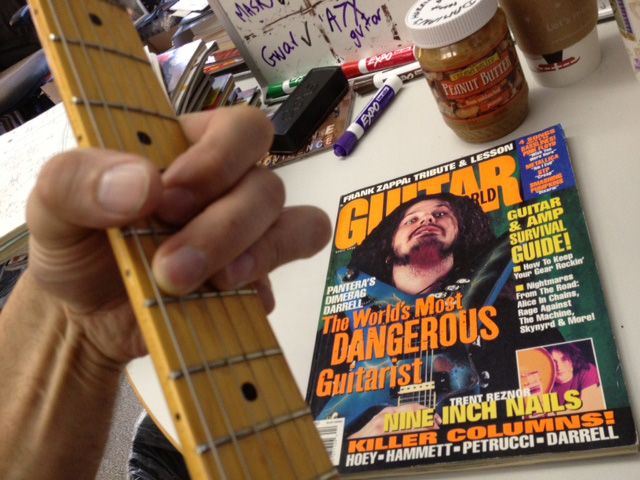Improve Your Vocabulary: Learn Chords, Chords and More Chords

I've always thought of music as a language, and in a way it's the best language because it crosses all boundaries. It's the Universal Language.
As with any language, the larger your vocabulary, the more thoughts you can convey. If someone is going to develop a sonic signature, often times it's their touch, vibrato, instrument and amp settings, etc., when playing lines or soloing.
But I find that just as importantly, chord voicings enter into play. You can't go wrong by enlarging your chord vocabulary. So many guitarists stop after learning majors and minors and only concentrate on soloing. It's like going through life knowing only 24 single-syllable words. There's only so much you can say.
I've been really fortunate to have been thrown into bands and situations with really gifted pianists in my life, not the least of which were Bruce Hornsby and Jon Cleary. In my early days, I was also in bands with piano players who taught me so much about voicings. Maybe it's the nature of the instrument and the way it's taught, but great piano players seem to always know a lot more about chord voicings than we do.
Guitarists who aren't trained (me:) are often intimidated by guys with formal knowledge, but I've always been curious. I never hesitate to shout out, “Hey, what did you just play there?” at a rehearsal or session. Here in Nashville there are tons of pianists who are absolutely amazing, whose brains I'm constantly picking for new ways to play combinations of notes I hadn't thought of.
Once I heard something I couldn't decipher, and the piano player explained he was playing a Gmaj over an Eb bass note, and arpeggiated it upwards. This kind of thing can also inform your soloing. Listen to the Motown recordings. On the surface, very simple, but some of it's pretty deep. On Junior Walker's “Road Runner," on the verse in F, there's a quick passing Ab chord over an A bass note, which shows the piano player's gospel influence. Not something any guitar player I know would naturally play. In fact, at one point in my life, I would've said you just can't do that. But it sounds so cool! These are the kinds of things that can be incorporated into your style on guitar.
Keith Richards' chord work is pretty self-evident. Not a brilliant soloist, but you know it's him immediately. Perfect example: “Can't You Hear Me Knocking." Most players I know don't know how to voice that part, as with so many others he's come up with. He's always looking for a unique combination of notes. Jimi Hendrix played in oddball keys just to get open strings that sounded weird. One usually doesn't volunteer to play in Db, but listen to “Freedom” and how he incorporates the low open E against the key.
Get The Pick Newsletter
All the latest guitar news, interviews, lessons, reviews, deals and more, direct to your inbox!
So pal up to a great keyboard player if you can. The Guitarist's Friend. Ask him how he's voicing things. He may be a jazzer or a classical player, but that's not gonna take anything away from your ability to rock. Explore the neck and see what's hiding from your fingers. It's all there and waiting.
Nashville-based guitarist George Marinelli is a founding member of Bruce Hornsby and The Range and has been a member of Bonnie Raitt's recording and touring band since 1993. He has performed and/or toured with Jackson Browne, James Taylor, Art Garfunkel, Shaun Colvin, Faith Hill, Dixie Chicks, Wynona Judd and Vince Gill, to name just a few. He is busy with session work as a sideman and as a solo artist, and he often can be found recording and producing indie projects at WingDing Studios.
George's CDs and downloads are available at AmazonMP3 and iTunes.









